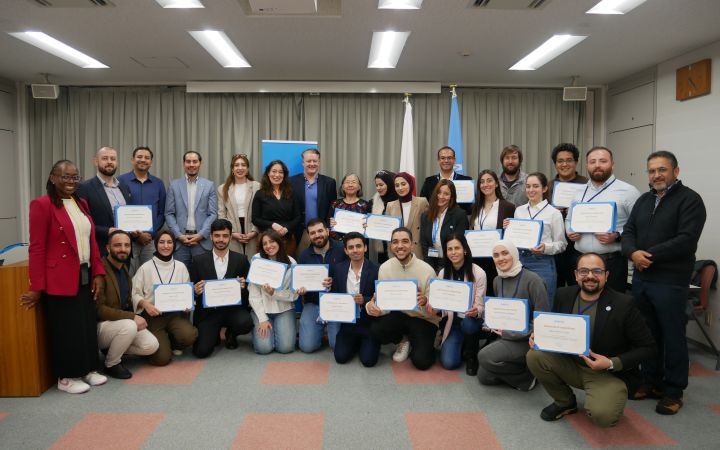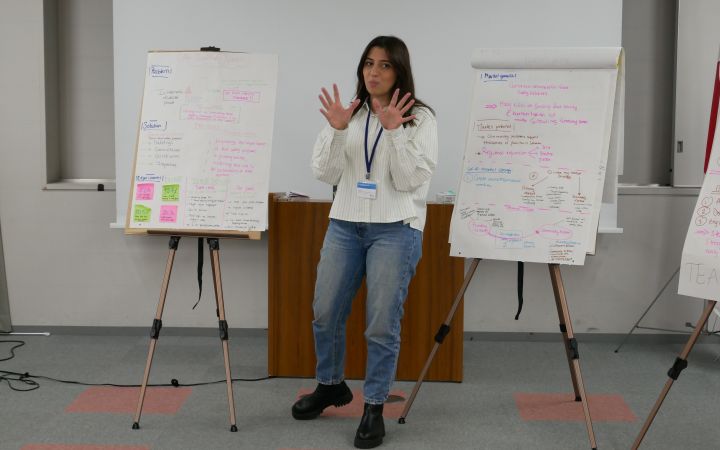- On 11 February, 17 entrepreneurs and innovators from Egypt, Iraq, and Lebanon showcased their business initiatives and models they refined through the Japan workshop of the “Entrepreneurship and Innovation: Promoting Food Security and Economic Development in Egypt, Iraq, and Lebanon” training programme.
- The Japan workshop ran from 4 to 11 February in Tokyo and Hiroshima with courtesy calls, study tours and expert-led interactive sessions.
- The entrepreneurship and food security programme, financially supported by the Government and People of Japan, aimed to equip participants with the practical skills and knowledge to develop businesses that contribute to sustainable and resilient food systems and economic development in the Middle East and North Africa region.
11 February 2025, Hiroshima, Japan – Seventeen entrepreneurs and innovators from Egypt, Iraq, and Lebanon showcased their business initiatives and models they refined through the Japan workshop of the United Nations Institute for Training and Research (UNITAR) “Entrepreneurship and Innovation: Promoting Food Security and Economic Development in Egypt, Iraq, and Lebanon” training programme. The in-person workshop, which ran from 4 to 11 February 2025, concluded with a Hackathon, where participants applied the lessons learnt through the entire programme to improve and pitch their final business initiatives.
The entrepreneurship and food security programme, financially supported by the Government and People of Japan, aimed to equip participants with the practical skills and knowledge to develop businesses that contribute to sustainable and resilient food systems and economic development in the Middle East and North Africa region. The programme focused on supporting innovation and micro, small and medium-sized enterprises, which play a central role in the region’s economy, by empowering youth entrepreneurs, leaders and innovators.
Study Tours in Tokyo: Japan’s Development and Innovation Hubs
The workshop in Japan began with a series of study tours and courtesy calls in Tokyo. In a courtesy visit to the Ministry of Foreign Affairs, the participants met with the Parliamentary Vice-Minister for Foreign Affairs, H.E. Mr. MATSUMOTO Hisashi. He encouraged the participants to use the knowledge gained from the training programme to foster innovation and contribute to local economic development in their respective countries.
The participants also visited Tokyo Innovation Base, a start-up campus and business networking hub and SHIBUYA QWS, an entrepreneurship and innovation hub, where they gained insights into innovation practices and initiatives in Japan and business incubation models that could be applied to their own countries and communities.
The innovation hubs we went to showed how much support the people of Japan have for entrepreneurs. The way innovation was fostered, is something inspiring and admirable. The way they provide all these platforms and support is something special. - Nathalie Fakher Eddine, public health professional, researcher, entrepreneur from Lebanon
Experimental learning and study tours in Hiroshima: Sustainable Agriculture in Practice
In Hiroshima, participants engaged in field visits, expert-led interactive sessions, group exercises and mentoring sessions. The field visits included a tour of Satake Corporation and Hiroshima Central Eco Park, where participants were exposed to Japan’s agricultural innovations and sustainable practices. Another highlight was the interactive and experimental learning sessions with two successful entrepreneurs from the Middle East and a Japan-based entrepreneur at Pitchfork Farms, where participants gained valuable insights into agritech innovations and sustainable agricultural business practices, covering organic farming, urban farms and precision farming.
The participants also engaged in interactive sessions on the development and implementation of sustainable business models, financial sustainability, climate resilience and adaptation, community engagement, food supply chains, digital marketing and branding, fundraising and financing, pitching of ideas, and leadership.
I struggled with how to communicate with my customers because biochar is still a new concept in the MENA region. During the recent sessions, I learned how to reach the right customer by presenting the right value without being too technical, which causes confusion. I work through the sustainable business model canvas, which I didn’t know before. Now, I’m applying it to better understand how valuable our proposition is. - Ahmed Hassanein, civil engineer and agribusiness entrepreneur from Egypt
Presenting Entrepreneurial Solutions
On the final day, through a Hackathon, the participants pitched their refined business models and project ideas, drawing from the knowledge and skills gained throughout the training programme. Their self-led and self-developed enterprises and projects aim to foster job creation and resilience in the agrifood sector and demonstrate both their innovation and readiness for operationalization.
Lynn El Berjawi, a food safety and management expert from Lebanon, showcased her project aimed at providing food safety programmes, training, certification and consultation to Lebanon’s growing network of community kitchens. The country has faced conflict, economic challenges and an increasing number of internally displaced individuals. These kitchens have become the source of food for many in need. Through the initiative, Lynn aims to prevent foodborne illnesses and enhance the quality of meals to vulnerable communities.
The UNITAR programme has provided me with a lot of deep entrepreneurial ideas, sustainable business models and more innovation strategies that we can implement. We've been through a lot of courses from phase one and two like financial models and revenue stream models - these are things that I was not familiar with. Being here in the in-person workshop has provided more practical tools that we could use with our programmes and start-up.“ - Lynn El Berjawi, food safety and management expert from Lebanon
At the closing ceremony, Chisa Mikami, Head of the UNITAR Hiroshima Office, congratulated the participants who successfully completed the training programme, which began in July 2024 with an online phase.
Your dedication and innovative ideas throughout this learning journey have not only contributed to growing your business projects but also reinforced your ability to contribute to a broader goal of achieving food security and resilient economies. I am confident that the skills and knowledge you have gained will blossom into innovative solutions to address the challenges faced in your communities, paving the path to a prosperous world for all.” - Chisa Mikami, Head of the UNITAR Hiroshima Office
UNITAR is dedicated to supporting the development of entrepreneurs and micro, small and medium-sized enterprises, with a particular emphasis on empowering youth, women and communities in vulnerable situations. The Middle East and North Africa region, which faces challenges such as food insecurity and rising unemployment, continues to benefit from these initiatives designed to create sustainable solutions through social innovation.
About “Entrepreneurship and Innovation: Promoting Food Security and Economic Development in Egypt, Iraq and Lebanon”
The “Entrepreneurship and Innovation: Promoting Food Security and Economic Development in Egypt, Iraq and Lebanon” is an entrepreneurship training programme for aspiring entrepreneurs, leaders, and members of micro, small, and medium enterprises in the three countries.
Funded by the Government and People of Japan, the programme equipped participants with the knowledge, skills, and network necessary to turn ideas for a social or for-profit enterprise into a business model that addresses challenges and contributes to building a resilient agricultural sector in the region. The training programme run in three phases from July 2024 to February 2025.
Learn more: https://unitar.org/about/news-stories/news/call-applications-entrepreneuship-and-innovation
About UNITAR
The United Nations Institute for Training and Research (UNITAR) is a dedicated training arm of the United Nations. In 2023, UNITAR trained over 540,000 learners around the world to support their actions for a better future. UNITAR has a global presence, with offices in Geneva, Hiroshima, New York and Bonn and networks around the world. Find out more at unitar.org.




